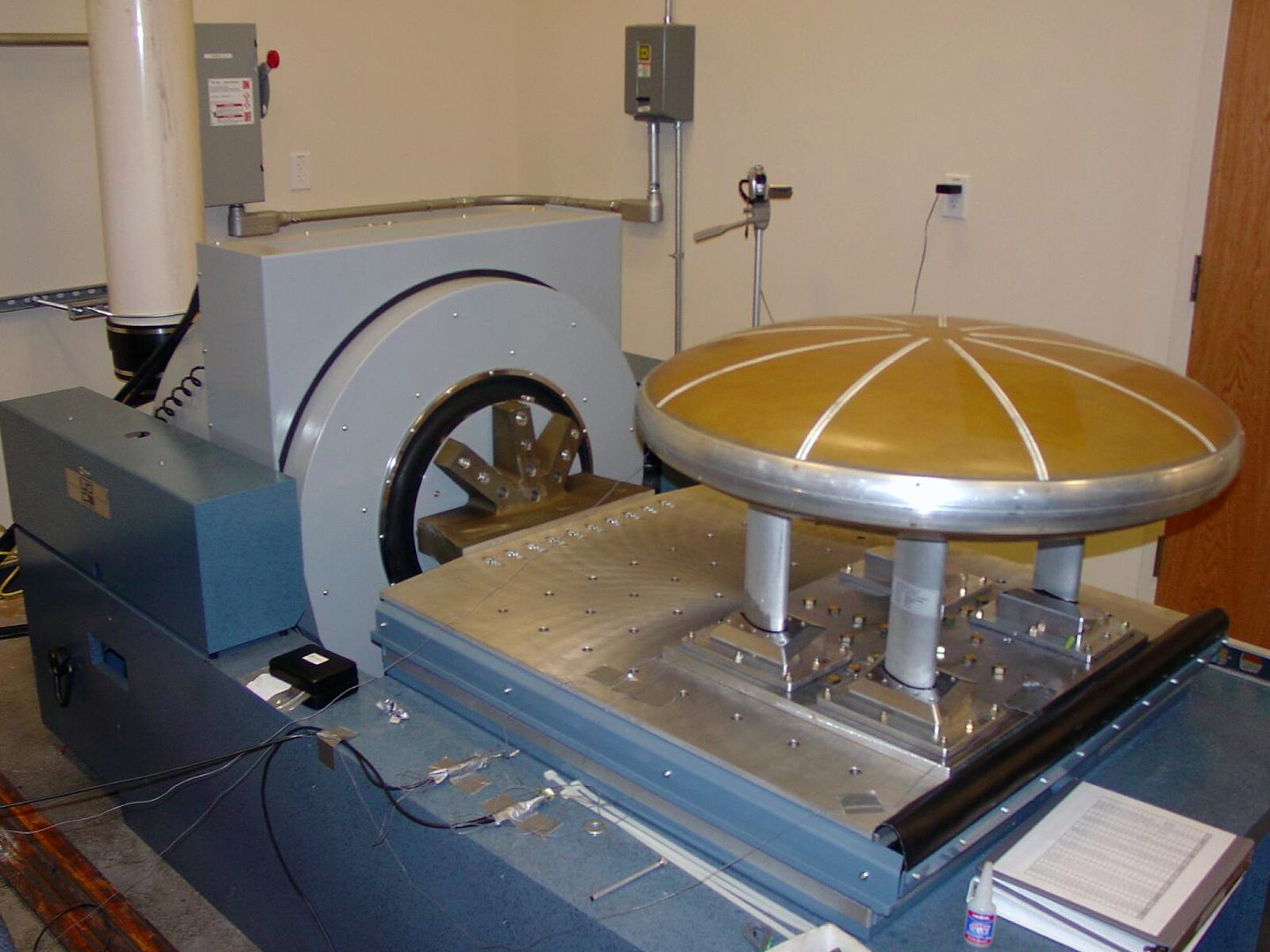Applied Technical Services performs a variety of methods in its capacity as a premier dynamic testing lab. Dynamics testing entails subjecting the samples or certain equipment to forces so that technicians can evaluate any physical or electronic performance characteristics of interest. Clients may request this branch of analysis for any of several reasons, including to qualify a product’s design materials, determine its performance under extreme conditions, to validate its final assembly’s durability pre-production, or even to investigate the root cause of a part’s mechanical failure. Our in-house mechanical and environmental testing labs perform a variety of dynamic methods to determine whether samples display a sturdiness in line with client expectations. These methods include:
Fatigue — repeatedly stressing a material sample (sometimes just applying tension, sometimes both tension and compression) until either reaching a pre-determined number of cycles or the sample fails.
- High- and Low-Cycle
- Wide Temperature Range (Ambient – 1000°C)
- Vast Load Range (2lbs – 55kip)
- Strain Gauging
- Fracture Toughness
- CTOD
- ASTM E466, E399*, E1290*, E606, E1820*
Vibration — placing a sample on a specialized table that exposes it to a series of vibrations (either an exacting regimen to determine its overall durability, or simulating those it could experience in transit, installation, or its intended service environment).
- Electrodynamic Shakers with AGREE Chambers for Temperature / Humidity Control
- Frequencies from 5Hz – 2000Hz
- High Force Capabilities (6,000lbf – 12,000lbf)
- Sine, Random, Sine on Random, Classic Shock, Resonance Search and Dwell, and Shock Response Spectrum (SRS)
- MIL-STD 810H Method 514.6*
- RTCA DO-160 Method 8*
- IEC 60068-2-27*, 60068-2-6, 60068-2-64*
Seismic — bears many similarities to vibration testing, but instead uses a hydraulic table that applies smaller forces with greater displacements at lower frequencies across three or more axes (controlling for pitch, roll, and yaw); more often used on final assemblies, as specifications may require the sample to successfully operate before, during, and after the shake.
- Triaxial Shaker with 36” × 36” Table
- 12” Peak Displacement (+/-6”)
- Velocity of 52IPS
- Broad Frequency Range (0.5Hz – 150Hz)
- IBC-Compliant
- ICC-ES AC-156*; IEEE 344*; GR-63-CORE*
Mechanical Shock — applying one large, mechanical jolt by accelerating the sample along a single axis (typically either with or against gravity) to see how the shock propagates through the material, whether any components loosen from the assembly, or other indications of nonconformance with design specifications.
- Functional, Crash Hazard, and Material-to-be-Packaged Shock Testing
- Reveals Friction Between Parts, Structural Failures, Variations in Electrostatic Field, and More
- MIL-STD 810H Method 516.6*
- RTCA DO 160 Section 7*
- IEC 60068-2-27*, 60068-29, 60068-31*
- SAE J1455
- MIL-STD 202G Method 205, Method 213
Impact — subcategory of mechanical shock wherein the sample material endures a sudden strike from an implement to assess its degree of resistance to impact; mostly used to validate materials or welds for end-products intended to withstand adverse environmental and stressful service conditions.
- Charpy, Izod, and Drop Weight Methods
- Find Impact Toughness, Ductile-to-Brittle Transition Temperature (DBTT), and Nil-Ductility Transition Temperature (NDT)
- ASTM E23*, A370*
- EN 10045-1*; EN ISO 9016*
- ISO 148-1*; ISO 180
- ASTM D256*; ASTM E208
Drop — subcategory of mechanical shock testing wherein technicians load the sample onto a machine that holds it at a certain height and orientation before dropping it either onto a raised hazard or directly onto the floor.
- Free-Fall and Tumble Drop Methods
- Determine Fragility and Validate Assemblies
- MIL-STD 810G Method 516.6*
- ASTM D4169, D5276, D7386
- ISO 2248
*indicates ISO/IEC 17025:2017 (A2LA) accredited test
Although the above testing methods may seem to vary greatly, they share the common trait of applying physical stimuli suddenly and/or repeatedly. Doing so gives technicians a better indication of how the sample would hold up when the final product is faced with an uncontrolled force in a service setting. Establishing whether the sample lives up to the degree of durability required in the product or component’s design specifications allows manufacturers to make any necessary changes earlier in the production process, ultimately saving them money
About Applied Technical Services
Applied Technical Services offers all the testing outlined above and so much more. We have enjoyed immense growth in the 50+ years since our founding. Much has changed since ATS began as a group of three engineers serving local businesses out of the founder’s basement in 1967. Now, we are a multidisciplinary firm aiding companies in their varied testing, inspection, and consulting engineering needs. Our team of over 1,000 technicians, inspectors, investigators, trainers, calibrators, Professional Engineers, scientists, and chemists serve clients operating in countries all around the world. Of the great many we serve in other capacities, the industries that most benefit from ATS’ capabilities as a dynamics testing lab include the following:
- Additive Manufacturing
- Conventional Manufacturing
- Oil and Gas
- Automotive
- Nuclear
- Defense / Military
- Aerospace / Aviation
- Communications
- Healthcare / Medical
- Consumer Products
Common Hardness Testing Standards
Every technician in our Marietta Super Lab performs dynamics testing methods in accordance with our ISO 9001:2015 registered quality management system. Doing so ensures that they uphold the quality expected of ATS by providing clear, accurate, and detailed reporting within a shorter turnaround window. Furthermore, we maintain an ISO/IEC 17025:2017 accreditation through the A2LA to perform many of the methods to regularly requested dynamics testing standards as specified above.
ATS upholds additional practices, beyond providing excellent testing services, to continually improve the customer experience. Whenever a client reaches out with a question — whether it pertains to the status or the results of their testing — our customer service specialists help connect them with relevant lab personnel for answers. These highly trained technicians remain accessible for clients who reach out, stay responsive to their needs, and prioritize finding a solution to their problem.
If your company needs the services of a tried-and-true dynamics testing lab, contact ATS today — We take a closer look!


